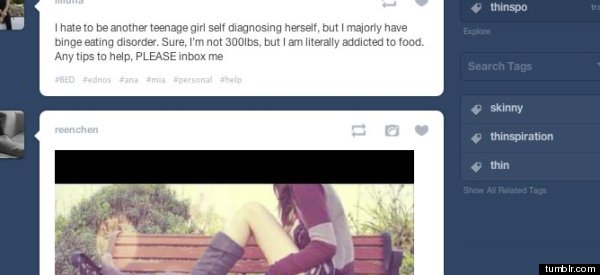
Six months after Tumblr, Pinterest and Instagram updated their content policies regarding eating disorders and self-harm, Pinterest has finally made a move to eliminate pro-anorexia pins once and for all.
Despite the ban on self-harm content outlined by Pinterest's revised acceptable use policy in March, the site has become even more popular among the pro-anorexia community, according to The Telegraph. Presumably, "pro-ana" bloggers who were "house-hunting" migrated over from Tumblr, the first platform to come under fire for housing the thinspo community.
After a period during which little was done to actually remove potentially damaging content, Pinterest has taken a major stand against the promotion of eating disorders by banning search terms like thinspo and thinspiration. These searches now redirect to a message that reads: "Eating disorders are not lifestyle choices, they are mental disorders that if left untreated can cause serious health problems or could even be life-threatening." Below, the page lists the toll-free number for the National Eating Disorder Association help line.
On Tumblr, however, the thinspo community remains active, as the tag still generates images of jutting hip bones and collarbones, as well as food-diary entries listing dangerously low calorie counts. Users who search for thinspo are also directed to the related tags "skinny," "thinspiration" and "thin."
 Screenshot from August 6, 2012.
Screenshot from August 6, 2012.
This content goes against Tumblr's content policy, revised in February, which mandates:
Don’t post content that actively promotes or glorifies self-injury or self-harm. This includes content that urges or encourages readers to cut or mutilate themselves; embrace anorexia, bulimia, or other eating disorders; or commit suicide rather than, e.g., seek counseling or treatment for depression or other disorders.
The staff blog post also stated that public service announcements would be displayed alongside search results relating to self-harms when users searched for these tags. The public service announcements were never put into effect.
"We have been trying to find a way from a design standpoint to get these inserted into search pages in the way that’s most effective," Marc LaFountain, Vice President of Support at Tumblr, told the Huffington Post. "We’re continuing to work on that issue."
Although many of the more extreme blogs have been pulled from the site or removed by their creators, the pro-ana community continues to thrive on Tumblr and elsewhere.
"There are so many millions of people on Tumblr posting tens of millions of things a day and I’m not going to tell you that we’re ever going to get it all," says LaFountain. "But the goal isn’t to get it all. The goal is when we see it or when it is reported to us and it’s clearly crossing the line, that we remove that content and provide the blogger with resources to get help."
As the debate around pro-anorexia's Internet empire has raged on, some critics have questioned the effectiveness of banning content related to eating disorders and self-harm. "When a piece of your identity vanishes, you find another website and rebuild it," Tara Storozynsky recently wrote in an essay published on Salon. "You rebuild it stronger than it ever was before."
What do you think of Pinterest's removal of pro-ana content? Will banning these pins help -- or will the community just move elsewhere? Share your thoughts in the comments below or tweet @HuffPostTeen.
